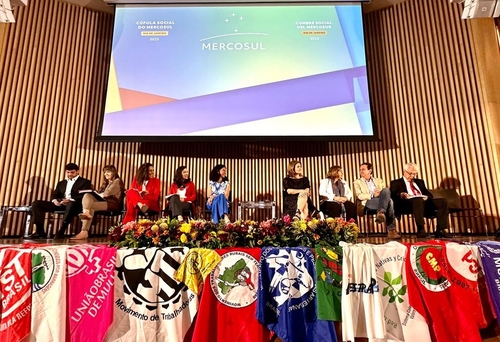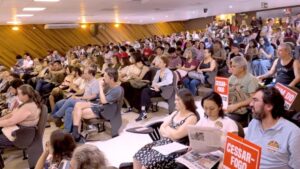
After seven years, Mercosur returned to having the Social Summit in person. The event, which promotes the participation of civil society in the bloc’s decisions, took place between the 4th and 7th of December, at the Museum of Tomorrow, in the central region of Rio de Janeiro.
The space allowed the debate on topics relevant to the populations of the Southern Cone countries, such as combating racism, reducing inequalities and the climate crisis. Experts believe that the return of this space is extremely important.
Political scientist and professor at the Federal University of Rio de Janeiro (UFRJ), Mayra Goulart explains that the resumption of the summit is an advance, as the political and social bias is as important as Mercosur’s economic perspective, since “the greater the openness, participation and dissemination of these mechanisms in civil society, the more it will see these mechanisms as legitimate, as something to be defended”.
“It is very timely to hold the social summit in this context that is on the eve of the rise of the extreme right, of Javier Milei’s inauguration in Argentina, because these organizations will need to be defended, as they needed to be defended during Jair Bolsonaro’s government. What these organizations represent, which is the idea of protecting the weakest, intervening in the defense of the weakest, is the opposite of what the extreme right defends”, says Goulart.
According to the professor of international relations at the São Paulo School of Sociology and Politics Foundation (FESPSP), Flávia Loss, the summit is necessary because it brings inequality reduction agendas to the center of the debate in Mercosur.
“These are discussions that we have internally in each society, but that we can have at a regional level. Think of the Southern Cone as a region for dialogue and advancement of this type of policy, affirmative action […] This already existed, it was stopped, but now it reinforces these civil society agendas that must be discussed within the scope of Mercosur”.
Mercosur-EU Agreement
One of the demands of civil society is the debate on the Mercosur agreement with the European Union. In a document, social movements expressed that if it is concluded without changes, the agreement will represent the deepening of the capitalist model that strengthens the elites.
Loss highlights that “this agreement has three pillars: the commercial one, which we already had access to the text; political and cooperation. These other two, the documents have not yet been released, civil societies from both blocks do not have access, we do not know what is being agreed. So it becomes difficult because when we look only at the commercial aspect, some parts are missing for us to understand what benefits we would also have within this agreement, which is why there is so much controversy and some resistance here in South America”.
Another topic under discussion is the climate crisis. According to Goulart, countries need to be connected to face this challenge. “There is no way for the country to create a domestic solution to the climate problem. These problems will not be resolved unilaterally, they will require efforts, cooperation and giving in, because the phenomenon, the catastrophe is global, so the solutions will also have to be global.”
Flavia Loss also notes that, despite the importance of the climate and environmental issue, there are obstacles to the agreement with the European Union.
“President Lula has reinforced that we already have robust environmental legislation and that we need financial collaboration to even ensure they are complied with, it is not a lack of commitment. So much so that Brazil, like our neighbors, are signatories to the main international sustainability regimes, they are committed countries. But we can’t meet all the goals for economic and financial reasons”, concludes the teacher.
The resumption of the Social Summit is a commitment from Brazil, which assumed the presidency of Mercosur in July this year. The country’s period in command of the bloc ended last Thursday (7).
Editing: Rodrigo Durão Coelho
Source: www.brasildefato.com.br

